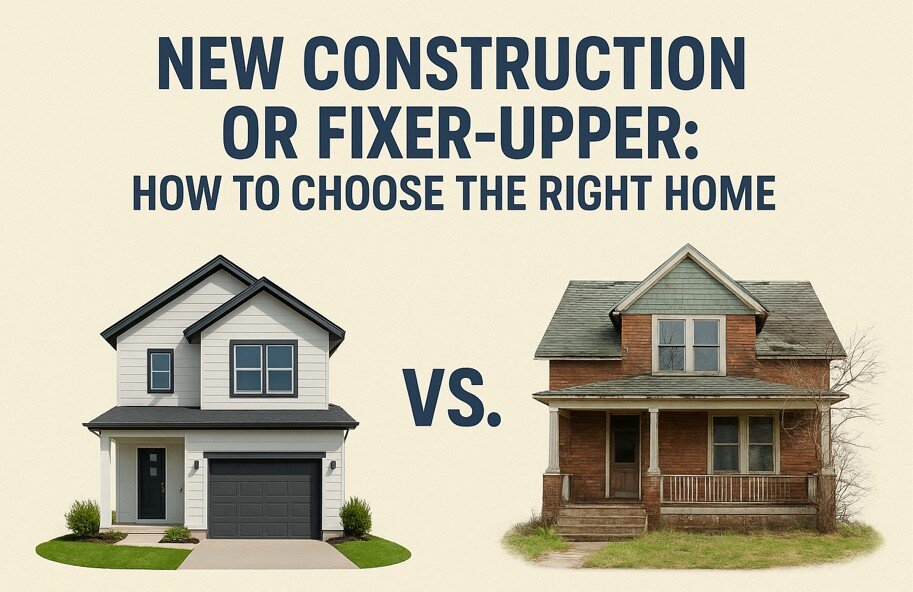
Buying a home is one of the biggest financial and lifestyle decisions you’ll ever make. One of the most common questions buyers face is whether to purchase a brand-new construction home or invest in an older fixer-upper and renovate it. Both options have unique benefits, challenges, and financial implications. Let’s break down the differences to help you choose the right path.
What’s the Difference Between a New Construction Home and a Fixer-Upper?
A new construction home is a recently built property, often move-in ready with modern layouts, energy-efficient systems, and updated finishes. On the other hand, a fixer-upper is typically an older home that may need cosmetic updates, repairs, or even major renovations to meet your needs.
The choice often comes down to budget, lifestyle, and how much time you’re willing to dedicate to upgrades.
Pros and Cons of Buying a New Construction Home
Advantages
- Move-in ready with minimal repairs needed.
- Energy-efficient features such as better insulation, modern HVAC, and smart technology.
- Lower maintenance costs in the first few years.
- Customization options if you buy before construction is complete.
Drawbacks
- Higher upfront cost compared to older homes.
- Smaller lot sizes in many developments.
- Potential construction delays if buying a pre-build.
- Less character compared to historic homes.
Pros and Cons of Buying an Old House to Renovate
Advantages
- Lower purchase price, leaving room in the budget for renovations.
- Potential for instant equity if renovations increase home value.
- More charm and character with unique architectural details.
- Larger lot sizes in established neighborhoods.
Drawbacks
- Unpredictable renovation costs due to hidden problems.
- Longer timeline before the home is fully livable.
- Higher ongoing maintenance compared to new builds.
- Financing challenges if the home requires major repairs.
Cost Comparison: New Home vs. Fixer-Upper Renovation
The cost difference can be significant:
- New construction homes often come at a premium price per square foot but include modern systems that save money over time.
- Fixer-uppers can be cheaper initially, but renovation costs can add up quickly, especially if structural or plumbing issues are uncovered.
Pro tip: Always budget at least 20–30% extra for unexpected renovation costs.
Which Option Is Better for First-Time Homebuyers?
For first-time buyers, a new construction home is often less stressful. With fewer repairs and predictable costs, it allows new homeowners to focus on adjusting to ownership.
However, a fixer-upper can be a smart choice for buyers with a lower budget who are handy or willing to manage contractors.
Long-Term Investment: New House or Renovated Old Home?
From an investment perspective:
- New homes appreciate steadily and attract buyers who want move-in ready properties.
- Renovated older homes can see higher returns if improvements significantly boost value, especially in desirable neighborhoods.
The best option depends on your local housing market and how long you plan to stay.
Lifestyle Factors: Modern Features vs. Historic Charm
Your lifestyle plays a huge role in the decision:
- Modern features like open floor plans, energy-efficient appliances, and smart-home technology are ideal for busy professionals or families.
- Historic charm with unique architecture and established neighborhoods appeals to buyers who value character and individuality.
How to Decide: Should You Buy New or Renovate an Older Home?
When deciding between new construction vs. fixer-upper, consider:
- Budget – Can you afford the higher upfront cost or the unpredictable renovation expenses?
- Timeline – Do you need to move in quickly, or can you wait for renovations?
- Lifestyle – Do you prefer modern convenience or classic charm?
- Risk tolerance – Are you comfortable with renovation surprises?
Ultimately, the right choice depends on your priorities. If you value convenience and peace of mind, a new home may be best. If you’re looking for affordability and customization, a fixer-upper could be the perfect investment.
FAQs
Is it cheaper to buy a new construction home or a fixer-upper?
In most cases, fixer-uppers cost less upfront, but renovation expenses can quickly add up. New construction homes are more expensive initially but often save money on repairs and energy costs in the long run.
Do fixer-uppers gain value after renovation?
Yes, a well-renovated older home in a desirable neighborhood can increase significantly in value, often generating a higher return on investment than buying new.
Are new construction homes worth the higher price?
For many buyers, yes. New construction homes offer modern layouts, energy efficiency, and minimal repairs, which can offset the higher upfront cost over time.
Which option is better for first-time homebuyers?
New construction is generally less stressful for first-time buyers due to fewer hidden costs. However, fixer-uppers can be a great entry point if you’re handy or comfortable managing renovations.
How do I decide between buying new or renovating old?
Consider your budget, timeline, and lifestyle. If you want convenience and predictability, go for new construction. If you value customization and potential equity, a fixer-upper may be the smarter choice.